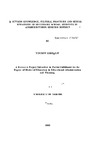| dc.contributor.author | Bett, Vincent K | |
| dc.date.accessioned | 2012-11-13T12:42:26Z | |
| dc.date.available | 2012-11-13T12:42:26Z | |
| dc.date.issued | 2003 | |
| dc.identifier.uri | http://erepository.uonbi.ac.ke:8080/handle/123456789/6232 | |
| dc.description | (data migrated from the old repository) | |
| dc.description.abstract | The purpose of the study was to investigate HIV/AIDS knowledge, cultural practices and sexual behaviour of Form Three secondary school students in Ainamoi Division Kericho District. The study sought to determine the HIV / AIDS knowledge and to identify cultural practices that promote the spread of HIV / AIDS. It also sought to investigate the sexual behaviour in response to the HIV/AIDS pandemic and knowledge level about condoms.
The research design used was survey research. The target population was 5449 students from 18 secondary schools. The researcher utilized a stratified random technique in obtaining the sample size of 432 respondents, 206 males and 226 females for the study. The study mainly used a questionnaire to collect data. A pilot study was conducted in seven secondary schools in Belgut Division. The pilot was used to determine the validity and reliability of the instrument. Data collected was analyzed using percentages, means and frequency tables. A computer programme Statistical Package for Social Sciences (SPSS) was used to analyze the raw data.
The study established that:
1. the respondents had gained HIV / AIDS knowledge through various sources; mass media, social activities, sex education in schools and religious organizations. However, they were rated moderate in level of HIV / AIDS know ledge.
2. the respondents 411 (96.3%) had heard of condom use while 299 (70.7%) had not used. The minority, 124 (29.3%), used to avoid sexually transmitted infections and pregnancy.
3. The respondents were sexually active and involved themselves in sexual intercourse as early as ten (10) years of age. The majority of the respondents 297 (69.2 %) felt within 17-19 years of age. The study indicated that they would even have sexual
intercourse with persons they had not known for long.
4. Respondents indicated some deeply rooted cultural practices in the area such as polygamous marriage, initiation, funeral rites and celebrations that encouraged the
spread of HIV / AIDS.
5. Respondents did not respond to all the items as indicated in the analyzed data.
The study recommended that: -
1. Educators and public health experts should teach reproductive health education in
secondary schools. Reproductive health education should not only be integrated in the curriculum but should also be taught in different sessions to encourage the youth to
change sexual behaviour.
2. Reproductive health education should be extended to lower primary, for the findings
indicated that pupils start sexual intercourse as early as the age of ten.
3. Traditional practitioners, in communities that still hold to cultural practices, such as initiation, should be educated on the use of sterilized instruments in order to control
the spread of HIV / AIDS.
4. Blood screening for HIV status should be encouraged for it might change
irresponsible sexual behaviour. Those tasted either negative or positive are counseled to protect themselves and not to spread the HIV virus respectively. | en_US |
| dc.language.iso | en | en_US |
| dc.publisher | University of Nairobi, CEES, Kenya | en_US |
| dc.subject | IDS (Disease) - - Kenya - - Kericho district - - Ainamoi division | en_US |
| dc.subject | High school students- -Kericho(district)- -Ainamoi(division)- -knowledge- -HIV/AIDS | en_US |
| dc.title | HIV/ Aids knowledge,cultural practices and sexual behaviour of secondary school students in Ainamoi division,Kericho district. | en_US |
| dc.title.alternative | Thesis (M.Ed.) | en_US |
| dc.type | Thesis | en_US |

